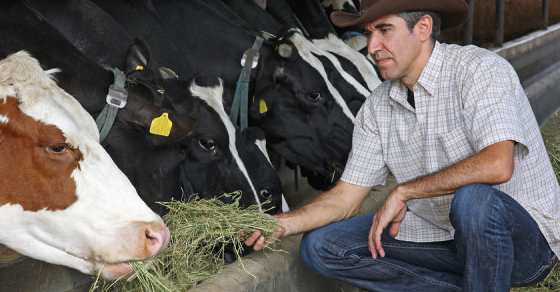Posted by Nat Two | May 10, 2014
Animals Prefer NON-GMO Feed and Farmers Say They are Healthier (And Happier)
There are a growing number of farmers reporting health problems with farm animals that are fed genetically modified feed, many are saying that animal health improves when feed is switched to non-GMO.
Troy Knoblock, a farmer who runs a hog nursery in Rock Rapids, Iowa, changed from feeding his animals GM feed to non-GMO feed several years ago, he didn’t think there would be a difference. In actual fact he said “We laughed about it.” But the differences he did see was in the health of his sows and young hogs. Knoblock, keeps in-depth records of his business. What he discovered was that drug treatments for sicknesses were cut in half. Sow conception rates increased from percentages in the 80s to 90s, and an increased size of hog litters. The switch to non-GMO feed “has made my operation a lot more enjoyable,” says Knoblock. Over the past few years he has also gradually increased plantings of non-GMO crops, this year all his corn and 75% of his soybeans will be non-GMO. “We have been very happy with yields of everything,” he says. Jon Blomgren, who works alongside Knoblock, also agrees. “Switching to non-GMO lowered our input costs. The seed is much cheaper, about $150-$160 per bag, while GM seed can cost $300 per bag.”
Knoblock believes more farmers will be switching to non-GMO production. “There is interest out there, and it’s catching on a lot,” he says. He is one of an increasing number of farmers who are reporting better animal health with non-GMO feed. Beef cattle farmer, Steve Tusa raises his herd in Alpha, Minnesota, has seen improvements with the use of non-GMO feed. Cattle deaths are down to digestive problems or pneumonia but since switching they have been cut in half from 1.2% of his herd to 0.6%. Tusa also grows 1400 acres of non-GMO corn which he uses mainly for feed. Tusa says “The yields are good as or better than my neighbor’s traited (GM) corn.” It is also coming to light that farmers are afraid to talk about their non-GMO production. “There are more people out here doing it, but no one wants to talk about it,” says Tusa.
Two more farmers who did not want to be named also expressed health improvements in livestock that were fed non-GMO feed. A Wisconsin farmer who raises young cows for dairy productions has physically seen overall better health and weight gain in his herd from non-GMO feed. The said “We haven’t done a scientific study; it’s just something we’ve seen with our own eyes.” The Wisconsin farmer also confirm he too has received good yields from non-GMO corn. “We haven’t lost yield, in fact yields have increased,” the farmer says.
The change to organic feed is producing even better results, confirms Jordan Simone Tate, CEO and founder of Nature’s Way Feed, Inc. “I’ve noticed a decline in mastitis issues from some of my clients’ cattle and goat herds, an increase in milk production as well as quality of milk. There is also better quality of eggs and poultry meat.”
Agriculture advisors are reporting better results with non-GMO feed, David W. Nelson, president of Minnesota-based Pedogenesis, Inc. says “If you want healthy animals, put them on a non-GMO diet. They will gain weight faster, their health and reproduction will be better overall.”
Art Dunham, a vet from Iowa, works mainly with dairy and beef cows and hogs, confirmed that he has seen many animal health problems due to GM feed and in particularly glyphosate herbicide. This is used mainly with Roundup Ready GM corn and soy. Problems found included reproductive problems in hogs and beef cows, botulism in dairy cows, and bloody bowels, rickets, and viral diseases in hogs. He confirms that “Glyphosate definitely increases many risks and makes it harder to have healthy animals.”
Can animals tell the difference between Organic corn and GM corn?? A South Dakota farmer tested this theory by putting non-GMO corn and GM corn into 10 envelopes, he placed three sets of envelopes in his shop, garage, and an utility shed for the mice to eat. Interestingly the mice ate through the non-GMO corn envelopes and left the GM corn envelopes untouched…

